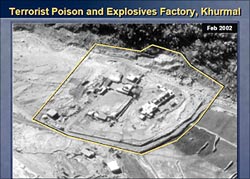When the pipeline vision vanished
When US soldiers in Iraq named their bases after oil companies, they were willy-nilly confirming what the entire world already knew – that the invasion of Iraq was over oil
Hunkered down in “Forward Operating Base Exxon” in the blistering sandstorms of central Iraq, soldiers of the 101st Airborne had at least one thing over their bosses in Washington – they were honest.
The Bush Administration, backed up by a chorus of pundits in the United States, vehemently denied that oil provides any rationale for war. The denials were so absolute, so acerbic in tone, that it was hard not to conclude that they protested a bit too much.
But whether or not the soldiers’ naming of the bases after oil companies shows a sense of humour or is a brilliantly subversive act of political theatre, the fact is that oil is central to US policy towards Iraq – and it has been for decades.
 |
|
An oil lake and blazing pipeline outside the |
Since the 1973 Arab oil embargo, successive US administrations have equated national security with access to, and control of, oil – particularly in the Gulf, which holds two-thirds of global oil reserves. In other words, as long as the US needs oil, the US needs the Gulf.
Faced with this fact, every President since Jimmy Carter has chosen to defend American “access” to the Gulf “by any means necessary”. “Regime change” in Iraq, the Bush Administration hopes, has ensured the long-term availability of Iraqi oil for US industry and consumers.
The smell of oil permeates the interest in Iraq: Iraq is the only country in the world that could conceivably begin to replace Saudi Arabia in the global oil economy; key Iraqi opposition figures are promising US companies access; and officials from Big Oil have met repeatedly with members of the Administration to plan a post-Saddam Iraq.
The history of US-Iraq relations provides important context for understanding current events. Several of today’s war hawks spent several years in the 1980s trying to get Saddam Hussein to sign an oil pipeline contract. Even though he was gassing Iranians at the same time, people like Donald Rumsfeld met with the “evil dictator” pitching a plan that would benefit their good friends in the oil industry.
From 1983 to 1985 Rumsfeld and the Reagan Administration chose to ignore the thousands of chemical bombs that Iraq was dropping on Iranian soldiers and villages, the very weapons of mass destruction that are today’s alleged cause for war.
Covering tracks
Following Hussein’s use of chemical weapons on the Iranians, the only response was instructions, recorded by then Secretary of State George Shultz, to the Iraqis that they not put Americans in the “embarrassing situation” of buying future chemicals that could be the source of supply for anything that could contribute to production of CW (chemical weapons)“.
In the post-hostage crisis USA, Reagan officials were much more interested in decrying “Iranian revolutionaries”. In private, they forged ahead with the pipeline plan and assured the Iraqis that “We do not want this to dominate our bilateral relationship.”
 |
|
The causus belli: images |
During this time, Rumsfeld flew to Baghdad, twice, as Reagan’s special envoy. According to newly available documents, a lot of his business was promoting the construction of a pipeline that would have run from Iraq through Jordan to the Red Sea port of Aqaba, and would have been constructed by Bechtel, a giant US construction firm.
Following a script crafted by Shultz – who went directly from the CEO seat at Bechtel into the Reagan team – Rumsfeld pitched the pipeline to Hussein in December 1983. Saddam told Rumsfeld that it sounded like a fine plan, but he was worried about the possibility of Israeli attack.
Rumsfeld wrote back to Shultz, “I said I could understand that there would need to be some sort of arrangements that would give those involved confidence that it would not be easily vulnerable. (This may be an issue to raise with Israel at the appropriate time)
For the next two years, Reagan administration officials, Bechtel, and pipeline promoters expended a lot of energy trying to placate Iraqi concerns, even while publicly, the US government “condemned” the use of chemical weapons in the Iran-Iraq War.
Behind the scenes, State Department officials forged ahead. Rumsfeld’s second meeting in Baghdad, again to press the pipeline scheme, occurred the same day that a United Nations team confirmed that Iraq gassed Iranian troops.
Shady deals
The revolving door between the Reagan administration, Bechtel, and other pipeline agents, produced a stream of shady dealings. An agent promised Israeli prime minister Shimon Peres a secret funnel of pipeline profits into the Israeli Labor Party.
Pipeline promoters and Reagan officials pondered other magic formulas – like committing, beyond congressional view, existing defense and foreign aid as collateral in case Israel did attack the pipeline. All to placate Iraqi concerns.
But it was all for naught. Two years after Rumsfeld broached the plan with Hussein, the dictator finally rejected Bechtel’s proposal. He found better pipeline deals involving Turkey and Saudi Arabia, and thought the US company doubled the actual construction cost.
Since then US-Iraqi business and political relations have never been the same again. Rumsfeld and other officials must have been steaming as they saw lucrative oil contracts signed between Baghdad and non-US corporations. They decried those who would profit from a man who possesses weapons of mass destruction.
|
| ||
|
|
Even the administration’s own words give away the game. Last August, Dick Cheney told the Veterans of Foreign Wars why Hussein has to be removed: “Armed with these weapons of terror and a seat at the top of 10% of the world’s oil reserves, Saddam Hussein could then be expected to seek domination of the entire Middle East, take control of a great portion of the world’s energy supplies…”
Cheney (whose former company, Halliburton, has received a Pentagon contract to assess Iraq’s oilfields) clearly doesn’t think that oil is irrelevant.
The lesson of the Aqaba pipeline, and the present state of affairs, is that an “evil dictator” is a friend of the US when he is ready to make an oily deal, and a mortal enemy when he is not.
The Bush Administration maintained that the war was all about weapons that no-one could find. Protestors and people around the world think it has a lot to do with what everyone already knows Iraq has and the US wants – oil.
Jim Vallette and Steve Kretzmann are Associates with the Institute for Policy Studies
Aljazeera
